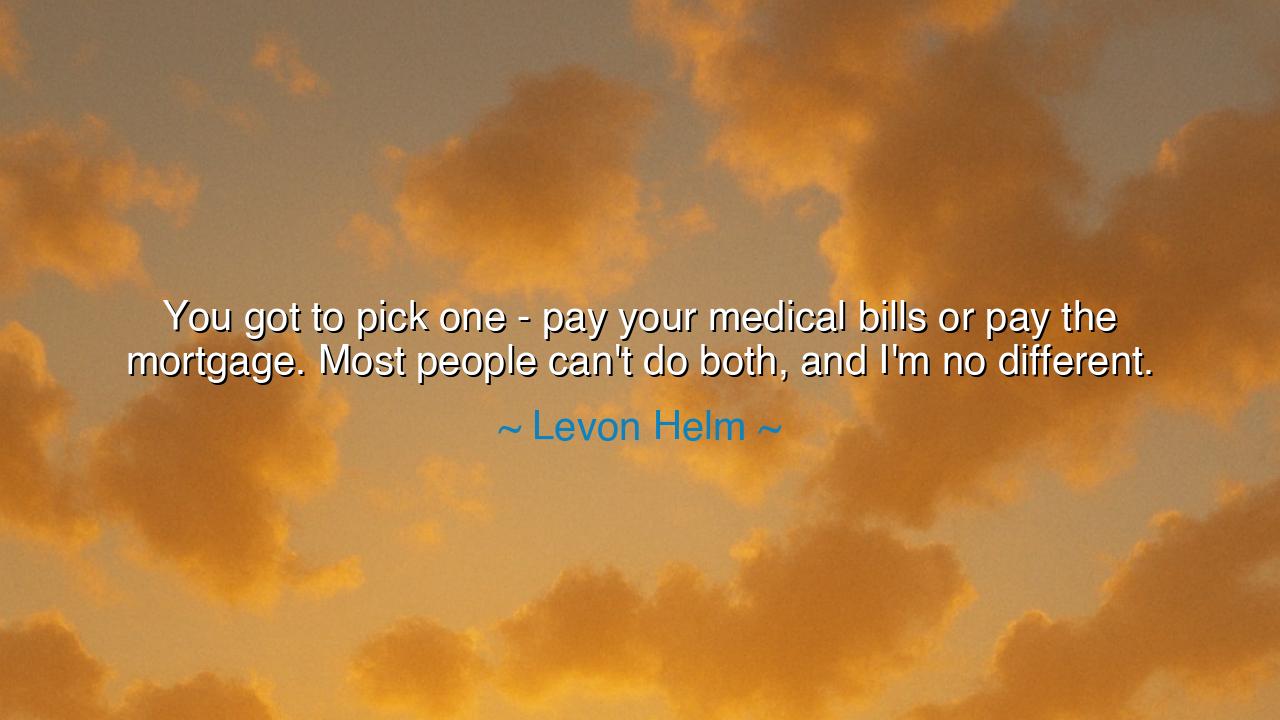
You got to pick one - pay your medical bills or pay the mortgage.
You got to pick one - pay your medical bills or pay the mortgage. Most people can't do both, and I'm no different.






When Levon Helm said, “You got to pick one — pay your medical bills or pay the mortgage. Most people can’t do both, and I’m no different,” he was not speaking only of his own hardship, but of a universal truth that echoes across generations: that the burdens of survival often force even the strongest among us to choose between health and home, between the body that carries us and the shelter that protects us. His words carry the weary wisdom of one who has known both fame and struggle, both abundance and loss. They are not merely about money — they are about the moral wound that festers when a society allows its people to suffer while simply trying to stay alive.
To choose between medical bills and a mortgage is a choice no person should have to make. In that cruel equation lies the tragedy of modern civilization — a world rich in invention and comfort, yet still poor in compassion. Helm, a musician whose songs celebrated the everyday man, spoke for millions who find themselves trapped in this quiet war between necessity and dignity. The ancients would have called such a dilemma a test of the soul. For what does it profit a person to preserve their body if they lose their home, or to keep their home while their health fades away? His lament is not self-pity; it is the cry of a man — and a people — caught in the tension between human need and human neglect.
The origin of Helm’s words lies in his later years, when illness and medical bills weighed heavily upon him. Once the proud drummer and voice of The Band, the group that helped define the sound of American rock, Helm found himself facing the same stark realities as those he had sung about. Despite his fame, he struggled financially after being diagnosed with throat cancer, a battle that cost him not only his voice but much of his savings. In speaking these words, he stripped away the illusions of celebrity and revealed the shared vulnerability of all who live within systems that measure care by currency. He was reminding us that even those who seem strong and successful are not immune to the injustices of the world.
The ancients, too, spoke of such injustice. In the writings of Solon, the lawgiver of Athens, there is a warning that a society which allows its citizens to fall into debt and despair is doomed to rot from within. When the poor are forced to sell their land or their bodies to survive, when mercy becomes a privilege and not a right, the foundations of the city begin to crumble. Helm’s words echo this same moral vision. He saw that the measure of a civilization is not its wealth or its art, but its care for the weak, its compassion for the ill, its protection of the home as sacred. To force a family to choose between shelter and healing is to erode the soul of the nation itself.
We might recall the story of Dorothea Dix, the 19th-century reformer who fought for humane treatment of the mentally ill in America. She saw the sick cast aside, locked away, and forgotten — much as Helm saw ordinary people crushed by medical debt in a land of plenty. Dix’s tireless struggle led to the creation of public hospitals and a movement toward compassion in care. Her legacy reminds us that the suffering of one voice can awaken the conscience of many. Helm’s statement, too, is a kind of reformer’s cry — not in the halls of government, but in the realm of the heart, urging us to remember that decency is not charity, but duty.
In Helm’s quiet words there is also solidarity. When he says, “I’m no different,” he humbles himself among the common folk — the workers, the farmers, the dreamers — who live one bill away from ruin. There is no arrogance in him, no complaint born of entitlement. Instead, there is kinship: a recognition that suffering, like music, binds us together. The ancients would have called this humility the highest form of wisdom. For only those who see themselves in others can speak with true authority. Helm’s pain becomes the people’s pain, his endurance their song of hope.
Thus, the lesson of Levon Helm’s words is both practical and profound: a just society must never force its people to choose between healing and home. Health is life, and home is dignity — to lose either is to lose part of what makes us human. Yet even beyond the political truth, there is a personal call: to live with empathy. When we see another struggle, let us not turn away in judgment or indifference. Let us ask how we might ease their burden, how we might use our own strength — however small — to uphold another’s peace. For no one is truly safe or whole until all are cared for.
And so, let Helm’s voice, once carried through the songs of The Band, now carry through time as a moral refrain: Choose compassion over convenience, and justice over comfort. Build a world where no one must weigh their heartbeat against their shelter. For as the ancients taught, the wealth of a people lies not in gold or power, but in the goodness they show one another. And when compassion governs the heart, no one — not even the weary or the sick — will ever have to say, “I can’t do both.”






AAdministratorAdministrator
Welcome, honored guests. Please leave a comment, we will respond soon